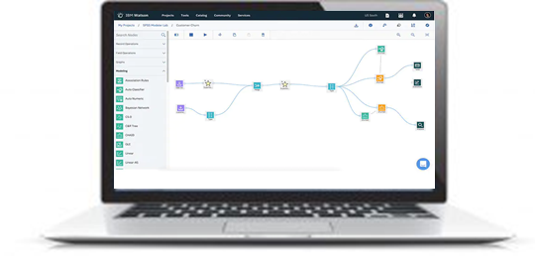@Copyright 2019 Numea
Statistical
training

Training
Statistical
training
Trainings, tutoring, events…

Statistical training
You come from the field of scientific research? You are looking to develop your ability to process and analyze quantitative data? Our training sessions are intended for all those who want to improve their knowledge in statistics.
Whether you are from the private or public sector, our academic training will provide you with practical tools to carry out your work, whatever your field of practice.
IBM SPSS Statistics
R, Python and SAS programming
MPlus
Statistical methods
IBM SPSS Statistics
Our most popular training sessions
- Start with IBM SPSS Statistics
Length: 1 day
Get a quick introduction to the use of SPSS software. Learn the basics of reading and organizing your data for analysis. Use the drop-down menus to access the commands needed to organize and explore your data - Introduction to statistical analysis with IBM SPSS
Length: 1 day
Find out how to produce your descriptive statistics and graphs using IBM SPSS Statistics software. Learn how to perform your mean comparison tests, chi-square tests and correlations - Introduction to personalized graphs with IBM SPSS Tables
Length: ½ day
See how to efficiently build simple and complex tables. Discover options for handling multiple responses, presenting variables with shared modalities, and exporting tables to other formats - Introduction to the use of IBM SPSS syntax
Length: 2 days
This training focuses on the effective use of the programming possibilities (syntax) offered by IBM SPSS software. Become autonomous and save time in preparing your data for analysis. In addition, learn how to automate your repetitive tasks - IBM SPSS: advanced syntax tips and notions
Length: 1 day
See all the possibilities offered by this software to manage your variables more efficiently. Optimize the management of your databases by learning the concepts of loops, vectors, and macros. Other tips and advanced features are discussed to help you automate your repetitive task
Other trainings are available. Please contact us.
R, Python and SAS programming
R
- Introduction to the use of the R software package
Length: 2 days
To introduce you to the possibilities of analysis offered by R, its characteristics, its structure and to acquire basic skills in data handling - Graphs and data visualization with R
Length: 1 day
Explore a range of graphical functions for three types of use: visual data mining, visual diagnostic assistance, and graphical representation of analysis results
Python
- Introduction to the Python language
Length: 2 days
To discover the possibilities that Python offers when manipulating and analyzing data - Predictive modeling with Python
Length: 1 day
Get an overview of the most common methods of analysis and machine learning used in data science. See how to apply these methods using Python
SAS
- Introduction to SAS software
Length: 2 days
Learn how SAS software works and its language. See how to read, manipulate, and transform your data in a DATA step. Learn how to use basic procedures to visualize and explore your data - Advanced SAS
Length: 1 day
You are using SAS software and want to program more efficiently? In addition to more advanced programming concepts, this course provides a brief introduction to the Macro language and SQL procedure. You will also see procedures for the statistical analysis of your data
MPlus
Our most popular training sessions
- Introduction to Mplus
Length: 2 days
Introduction to structural equation models. Be able to run these models, interpret their results and judge validation statistical indices - Factorial analyses with Mplus
Length: ½ day
Learn how to perform exploratory and confirmatory factor analyses using different factor rotations - Latent class analysis with Mplus
Length: ½ day
Learn how to perform person-centered analysis. See also 3-step comparison analysis, latent transition analysis and latent path class analysis - Introduction to longitudinal analyses with Mplus
Length: 1 day
Study the evolution of a longitudinal variable and the heterogeneity of its trajectory (latent trajectory analysis and latent trajectory class analysis). Also look at temporal causality and co-evolution between two longitudinal variables (cross autoregressive model and parallel trajectory analysis
Statistical methods
Several training courses on practice-oriented statistical methods that use examples produced using different software or language (SPSS, MPlus, SAS, CMA, R, Python) are available:
Data mining techniques and data organization
- Preparation and data mining
- Introduction to statistical analysis
Length: 1 day
Learn how to produce your descriptive statistics and graphs. Learn how to do your mean comparison tests, chi-square tests and correlations
Classical techniques of statistical analysis
- Variance analysis
- Linear and logistic regression
- Survival analysis
- Time series
- Cluster analysis
- Factorial analysis
- Longitudinal analysis
- Correspondence analysis
- Statistical power
- Introduction to meta-analysis
- Mixed models
- Latent class analysis
- Introduction to OCR analysis
- Inter-judge agreement
- Negative binomial regression and Poisson regression
For more details or other trainings, please contact us.


